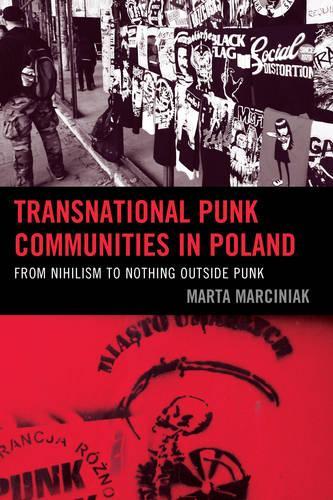
Transnational Punk Communities in Poland: From Nihilism to Nothing Outside Punk
(Hardback)
Publishing Details
Transnational Punk Communities in Poland: From Nihilism to Nothing Outside Punk
By (Author) Marta Marciniak
Bloomsbury Publishing PLC
Lexington Books
16th July 2015
United States
Classifications
Tertiary Education
Non Fiction
Social groups: alternative lifestyles / subcultures
Popular music
306.109438
Physical Properties
Hardback
268
Width 161mm, Height 236mm, Spine 24mm
544g
Description
A Transnational History of Punk Communities in Poland is a multi-regional study of the history and contemporary condition of two Polish punk communities: the one in Warsaw and surrounding areas, and the Upper Silesian region: both rich in varied and sometimes conflicting punk traditions. The author, a self-identified member of the punk subculture formerly living and active in Warsaw, explores the various political, economic and social dimensions of the development of these unique communities and the meaning of the punk ethos for people across different age groups, genders, and life experiences, in relation to other subcultures, especially skinheads, and the broader society. An additional dimension, previously unexplored in scholarship, are the ties between these Polish punk communities and their counterparts in the United States and Canada. The personal connections between early bands and the long lasting transnational aspects of punk practices are shown to be an important factor in the shaping of punk attitudes across time and space. The economics of everyday punk life are discussed referring to contemporary scholarship on the subject, punk lyrics, and ethnographies which throughout the book illustrate selected themes and problems. This study includes insight about obscure yet foundational Silesian bands and their defiant, sardonic humor; about punk and anarchy, punk versus communism and the political opposition in the 1980s, punks attitudes toward the transformation of 1989, about being a punk girl on the streets of Warsaw or Wodzisaw lski. Discover punk as an old subculture that cherishes its own past and remains an important alternative to mainstream cultural practices in a rapidly Westernizing and corporatizing country.
Reviews
In this unique book, Marciniak provides adetailed exploration of the punk subculture in Poland and the US. Based on her dissertation work, the book compares and contrasts communities of the subculture in Polands Warsaw and Upper Silesia regions with their US counterparts in New York, Cleveland, and New Jersey. In the book's five chapters, she provides anethnographic exploration of the oral history, subcultural practice, and socio-political environments of 1980s punk communities. Marciniak first explains the concepts of the DIY ethic, modernity, gentrification, and outsiderism as a foundation of how these communities arose. From these concepts, the author moves on to discuss influences and connections that Polish punk has to punk in Cleveland and New Jersey, considering political and nihilistic attitudes toward governmental ideologies. Of particular note is Marciniaks concise unfolding of punk histories and their connections to prominent bands, lyrics, and cultural practices. She includes exhaustive notes, a list of interviewees, and an appendix of questions used during her fieldwork. Overall, this volume offers musicologists, punk aficionados, and anthropology students an insightful look at punk subcultural practice through a global and historical lens. Summing Up: Recommended. Upper-division undergraduates through faculty. * CHOICE *
An important contribution to Punk as a way of life and international movement. Marciniak identifies the essential elements of Punk, tracing their development in Poland from the pre-punk socio-political climate through the punk culture there today. -- Anne Cecil, Drexel University
Marta Marciniaks Transnational Punk Communities in Poland: From Nihilism to Nothing Outside Punk captures the complexities and contradictions of punk on the local level, and the connections between punks transnationally. For those who read the occasional scene reports in Maximum Rocknroll from behind the Iron Curtain, this book documents the history of the formation of a worldwide community of ideas and ideals through punk scenes. Wide-ranging, alternately dense and lyrical, deeply personal and deeply researched, this beautifully written work demonstrates the connections between disparate punk histories from Cleveland and New York to Warsaw and Silesia and beyond with passion and tremendous insight. -- Dewar Macleod, William Paterson University
Author Bio
Marta Marciniak received her PhD in American Studies from the University of Buffalo, The State University of New York.
